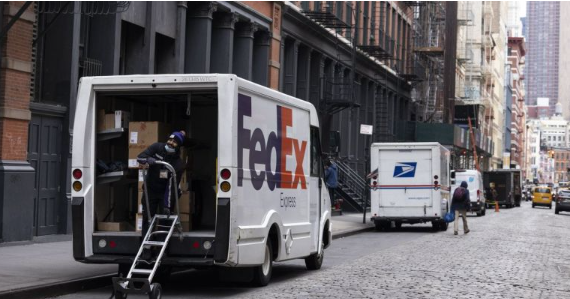
New York City Department of Transportation (NYC DOT) Commissioner Ydanis Rodriguez announced today that the city received a $5.6 million federal grant from the United States Department of Transportation’s (USDOT) Rebuilding American Infrastructure with Sustainability and Equity (RAISE) program. This funding will be used to create an Urban Freight Mobility Collaborative (UFC), an innovation hub designed to revolutionize urban freight movement and significantly reduce greenhouse gas emissions — the first of its kind in the United States.
The NYC DOT UFC will establish a series of public-private partnerships and engage with community, industry, and academic partners to significantly decarbonize the freight sector. The mission of the UFC is to mitigate the negative impacts of freight movement, targeting a 40 percent reduction in greenhouse gas emissions by 2032.
The UFC will develop buildable short-term project designs in five priority areas, focusing on environmental justice neighborhoods and Industrial Business Zones (IBZs). Emerging technologies and strategies, such as micro-distribution centers (microhubs), common-carrier lockers, commercial cargo bicycles, micro-mobility solutions, medium and heavy-duty electric freight vehicles, and new waterborne freight infrastructure, are some of the pilot projects that will be researched and improved under the UFC.
The initiative will emphasize interagency and private data collection, the development of a comprehensive freight modeling tool, and leverage robust community engagement strategies to ensure inclusive participation. The foundation laid by the UFC is poised to significantly enhance the city’s sustainable delivery and logistics efforts, setting a new standard for urban freight management.
“We are thrilled to see NYC DOT receive a USDOT RAISE grant to launch a new Urban Freight Mobility Collaborative. NYC is leading by example in reducing the impact of freight delivery on city streets by promoting greener and more efficient truck deliveries, expanding the use of waterways, railways, and cargo bicycles for goods movement, and fostering new technologies to make freight movement more efficient,” said Dr. Anne Goodchild, professor and founder of the Urban Freight Lab at the University of Washington.
“At the Urban Freight Lab at the University of Washington, we have seen firsthand how collaborative efforts across sectors and with the community yield innovative solutions that provide significant environmental and operational benefits. We look forward to sharing insights with our partners in NYC and working together to develop urban freight systems that improve equity, tackle climate change, and improve livability in our cities.”